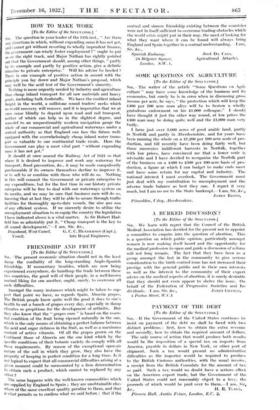HOW TO MAKE WORK
[To the Editor of the SPECTATOR.] SIR,- The question in your leader of the 11th inst., " Are there ally directions in which, without expending.sums it hai not got, and cannot get without resorting to wholly imprudent finance, the government can wisely foster employment ?" ought to put its on the right track, and Major Nathan has rightly pointed out that the Government should, among other things, " partly by its example and partly by positive action, give a definite stimulus to private enterprise:" • Will his advice be heeded There is one example of positive action in accord with the principle you lay down 'and Major Nathan's proposal, which may well be the acid test of the Government's sincerity.
Nothing is more urgently needed by industry and agriculture than cheap inland transport for all raw materials and heavy goods, including bulk foodstuffs. We have the costliest inland freight in the world, a millstone round traders' necks which no world reeovery will remove, and it is imperative that we at once cease blindly to depend upon road - and rail transport, neither of which can help us in the slightest degree, and remodel to an unquestionably modern navigation gauge the whole of Our conunercial and agricultural waterways under a central authority so that England can face the future well- equipped with the overwhelmingly cheap inland water trans- port so valuable to our continental trade rivals. Here the Government can play a most vital part without expending sums it has not got."
It should at once amend the Railway Act of 1921 so that
where it is desired to improve and work any waterway for transport, flood prevention, &c., it may be made compulsorily purchaseable if its owners themselves decline to improve it, or to sell to or combine with those who will do so. Nothing in this will commit the Government or private enterprise to any expenditure, but for the first time in our history private enterprise will be free to deal with our waterways system on its merits, and we may be sure that businesi men will do so, knowing that at last they will be able to secure through traffic facilities for thoroughly up-to-date vessels, the sine qua non of any efficient system. If we sincerely desire to utilize the unemployment situation to re-equip the country the legislation I have indicated above is a vital matter. As Sir Robert Had- field has so admirably put it, " Cheap transport is the key to all sound development."—I am, Sir, 2ke.;






























 Previous page
Previous page